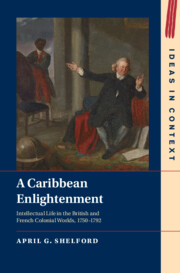Book contents
- A Caribbean Enlightenment
- Ideas in Context
- A Caribbean Enlightenment
- Copyright page
- Dedication
- Contents
- Figures
- Maps
- Tables
- Acknowledgments
- Note on the Text
- Abbreviations
- Chapter 1 What Is a Caribbean Enlightenment?
- Part I Before Breadfruit
- Part II Creating Enlightened Citizens
- Part III Tristram in the Tropics: or, Reading in Jamaica
- Part IV Cultivating Knowledge
- Introduction to Part IV
- Chapter 10 “Je sçais par une longue expérience”
- Chapter 11 Agricultural Enlightenment in the Saint-Domingue Press
- Chapter 12 The Enlightened Planter
- Conclusion to Part IV
- Chapter 13 Concluding Reflections
- Bibliography
- Index
Chapter 10 - “Je sçais par une longue expérience”
from Part IV - Cultivating Knowledge
Published online by Cambridge University Press: 14 September 2023
- A Caribbean Enlightenment
- Ideas in Context
- A Caribbean Enlightenment
- Copyright page
- Dedication
- Contents
- Figures
- Maps
- Tables
- Acknowledgments
- Note on the Text
- Abbreviations
- Chapter 1 What Is a Caribbean Enlightenment?
- Part I Before Breadfruit
- Part II Creating Enlightened Citizens
- Part III Tristram in the Tropics: or, Reading in Jamaica
- Part IV Cultivating Knowledge
- Introduction to Part IV
- Chapter 10 “Je sçais par une longue expérience”
- Chapter 11 Agricultural Enlightenment in the Saint-Domingue Press
- Chapter 12 The Enlightened Planter
- Conclusion to Part IV
- Chapter 13 Concluding Reflections
- Bibliography
- Index
Summary
Drawing on his experience as a planter, Father Jean-Baptiste Labat (1663–1738) disentangled details about sugar cultivation and production from the limited discussions found in natural histories and travel accounts to create a full-fledged planters manual in Nouveau Voyage aux isles de l’Amérique (1722). Elie Monnereau did the same for indigo in L’art de l’indigotier (1765), which detailed the “art” of cultivation and processing and the “science” of plantation management, including the regulation of enslaved laborers. His treatise also suggested how his peers shared information through manuscripts; his visual representation of indigo production, superior to previous versions, became a model for others after influencing Beauvais-Raseau’s L’art de l’indigotier (1770), published by the Académie Royale des Sciences. Discussion of Labat and Monnereau/Beauvais-Raseau demonstrates how Caribbean agriculturalists addressed the problems common to anyone seeking to communicate practical and technical information: What elements of a description made it particularly informative? What should an illustration include to make it most useful? How could text and illustration together facilitate communication? Discussion of Monnereau’s and Beauvais-Raseau’s treatises also underscore the differences between colonial and metropolitan agendas in the production and promulgation of agricultural knowledge.
Keywords
- Type
- Chapter
- Information
- A Caribbean EnlightenmentIntellectual Life in the British and French Colonial Worlds, 1750–1792, pp. 255 - 281Publisher: Cambridge University PressPrint publication year: 2023

